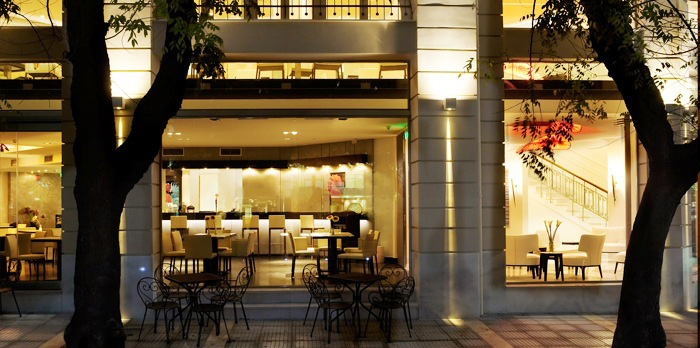For tea in Thessaloniki
Sometimes it is very interesting and useful to know how other people see you. This is how a German journalist sees Thessaloniki through his article for Die Welt, a German national daily newspaper.
For tea in Thessaloniki
Has the German reputation been ruined? No, our author was cordially welcomed. Recently, they poured coffee over the head of the German consul. But, who are “they”? Three hooligans, strongly condemned by the tabloids of the country and directly acquitted by the court.
The incident was a disgrace to the culture of Greek hospitality, says Kostas Tornivoukas. “Our countries are linked together, because we cannot be parted.” The blue-eyed hotel-owner is the owner of the venerable city hotel “Excelsior”, which he has lovingly restored despite the crisis and in the hope of dignified guests. An elegant house with art deco balconies and a jazz cafe. Tornivoukas pretty much knows what he’s talking about. At least once a year, he travels with his wife, Eleni, to Germany – to admired Berlin with the beautiful Gendarmenmarkt or beloved Dresden, above Weißen Hirsch, to visit relatives. “You know, my grandmother still spoke Saxon even here in Thessaloniki. In the 20s, she met my grandfather, a Greek tobacco merchant, in Dresden, and brought him with her to Greece, where the hoteliers tradition of our family began.”
Over tea, octopus salad and white wine, we sit at a café, in front of the hotel. And instead of complaining, the couple talks about their project, to bring their Saloniki, as they call Thessaloniki for the sake of simplicity, more into the focus of German cities and travellers. Should anything here be somewhat covered? Probably not, because why not discover a hitherto rather blind spot on the map of German travel agencies, a historically tense city by the sea, only two hours away from Berlin and Munich? In the city by the sea, the Balkans, Asia Minor and the biblical antiquity have always intersected. In Saloniki, the distances are manageable – and, in contrast to Athens, the pollution-free streets and sidewalks are full of trees, quaint little kiosks and cafes. As you walk, a little historical knowledge is present.
You only see what you know. For example, in the flower market behind the Fraggini street, isn’t there the massive building of an Ottoman hammam? Doesn’t the colourful Modiano market, with its covered arcades overflowing with vegetable and fruit, once the centre of the Jews that were displaced from Spain in 1492 and came to Saloniki as refugees, resemble the similar places in Jerusalem or Istanbul, with the former mosque vis-à-vis? And how does that sky blue art-deco building, one of many in the city, match, on the next street corner? These questions are answered by a short course of history: After the Greco-Roman-Byzantine beginning, the city became Ottoman in the 14th Century, for 500 years – until 26 October 1912. The fact that, a few years later, a fire damaged many of the elegant old houses and political turmoil struck the city has long been part of the collective memory, where something positive has now been added: This year’s celebration of the liberation from the Ottoman occupation had no nationalistic criticism against the Ottomans. On the contrary: a new exhibition has just opened in the Atatürk House, because the father of modern Turkey was born in 1881 in Saloniki – and the former archenemies are now more than welcome. And on the weekends, you can meet at the lounge of the cafes on the streets leading to the sea and at cosy places where you will see fewer machos with heavy perfume and gold chains than likeable young people who fiddle around with their laptops.
You can even gain something from the crisis: Many products in the shops, now so far away from the shining days of luxury craze, have now become much cheaper. And the many visitors from Belgrade, Skopje, Tirana, Moscow and Beirut, plus all the Israeli travellers? “Irony of history” is how the German-speaking Deputy Mayor, Spiros Pengas, calls this development. “For these guests, we are suddenly the cheap outpost to the west. For decades, we had wanted here to resemble Paris and Milan and be able to give up our neighbours from the east. Now, these consume here, in Saloniki.”And everything is there in the next morning to discover: the Film Museum on the Quai, in which sequences filmed in Thessaloniki of the world famous works of Theo Angelopoulos, the “Greek Wim Wenders’, are shown. Or the architecturally stunning Aristotelous square, which also leads straight to the sea-front.
Source: http://www.welt.de/print/wams/reise/article111757492/Auf-einen-Tee-in-Thessaloniki.html

